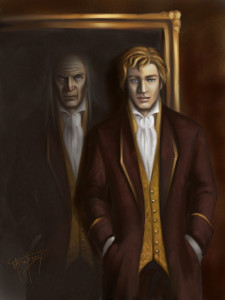From The Picture of Dorian Gray, by Oscar Wilde.
These extracts come from the 1890 text, before Wilde was obliged, in the interests of propriety, to introduce edits that would tone down any allusions to ‘the love that dare not speak its name’.
In the first Dorian, still reeling from the death of the actress Sybil Vane, has decided to hide the now loathed painting in his attic and is awaiting the arrival of the workmen he has summoned to move it. At the start of this extract it is Dorian’s housekeeper, Mrs Leaf, who is speaking.
A portrait of Dorian Gray, by Mercuralis
‘The old school-room, Master Dorian? Why, it’s full of dust. I must get it arranged and put straight before you go into it. It’s not fit for you to see, Master Dorian. It is not, indeed.’
‘I don’t want it put straight, Leaf. I only want the key.’
‘Well, Master Dorian, you’ll be covered with cobwebs if you goes into it. Why, it hasn’t been opened for nearly five years, not since his lordship died.’
He winced at the mention of his dead uncle’s name. He had hateful memories of him. ‘That does not matter, Leaf,’ he replied. ‘All I want is the key.’
‘And here is the key, Master Dorian,’ said the old lady, after going over the contents of her bunch with tremulously uncertain hands. ‘Here is the key. I’ll have it off the ring in a moment. But you don’t think of living up there, Master Dorian, and you so comfortable here?’
‘No, Leaf, I don’t. I merely want to see the place, and perhaps store something in it, that is all. Thank you, Leaf. I hope your rheumatism is better; and mind you send me up jam for breakfast.’
Mrs. Leaf shook her head. ‘Them foreigners doesn’t understand jam, Master Dorian. They calls it ‘compot.’ But I’ll bring it to you myself some morning, if you lets me.’
‘That will be very kind of you, Leaf,’ he answered, looking at the key; and, having made him an elaborate courtesy, the old lady left the room, her face wreathed in smiles. She had a strong objection to the French valet. It was a poor thing, she felt, for anyone to be born a foreigner.
As the door closed, Dorian put the key in his pocket and looked round the room. His eye fell on a large purple satin coverlet heavily embroidered with gold, a splendid piece of late seventeenth century Venetian work that his uncle had found in a convent near Bologna. Yes, that would serve to wrap the dreadful thing in. It had perhaps served often as a pall for the dead. Now it was to hide something that had a corruption of its own, worse than the corruption of death itself, something that would breed horrors and yet would never die. What the worm was to the corpse, his sins would be to the painted image on the canvas. They would mar its beauty, and eat away its grace. They would defile it, and make it shameful. And yet the thing would still live on. It would be always alive.
He shuddered, and for a moment he regretted that he had not told Basil the true reason why he had wished to hide the picture away. Basil would have helped him to resist Lord Henry’s influence and the still more poisonous influences that came from his own temperament. The love that he bore him—for it was really love—had something noble and intellectual in it. It was not that mere physical admiration of beauty that is born of the senses, and that dies when the senses tire. It was such love as Michael Angelo had known, and Montaigne, and Winckelmann, and Shakespeare himself. Yes, Basil could have saved him. But it was too late now. The past could always be annihilated. Regret, denial, or forgetfulness could do that. But the future was inevitable. There were passions in him that would find their terrible outlet, dreams that would make the shadow of their evil real.
He took up from the couch the great purple-and-gold texture that covered it, and, holding it in his hands, passed behind the screen. Was the face on the canvas viler than before? It seemed to him that it was unchanged; and yet his loathing of it was intensified. Gold hair, blue eyes and rose- red lips—they all were there. It was simply the expression that had altered. That was horrible in its cruelty. Compared to what he saw in it of censure or rebuke, how shallow Basil’s reproaches about Sibyl Vane had been!, how shallow and of what little account! His own soul was looking out at him from the canvas and calling him to judgment. A look of pain came across him and he flung the rich pall over the picture. As he did so, a knock came to the door. He passed out as his servant entered.
‘The persons are here, monsieur.’
He felt that the man must be got rid of at once. He must not be allowed to know where the picture was being taken to. There was something sly about him and he had thoughtful, treacherous eyes. Sitting down at the writing-table, he scribbled a note to Lord Henry, asking him to send him round something to read, and reminding him that they were to meet at eight-fifteen that evening.
‘Wait for an answer,’ he said, handing it to him, ‘and show the men in here.’
* * * * *

